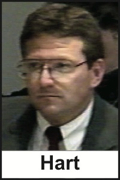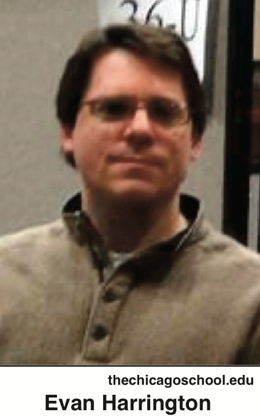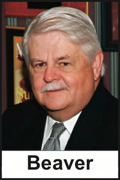Rascals case in brief
In the beginning, in 1989, more than 90 children at the Little Rascals Day Care Center in Edenton, North Carolina, accused a total of 20 adults with 429 instances of sexual abuse over a three-year period. It may have all begun with one parent’s complaint about punishment given her child.
Among the alleged perpetrators: the sheriff and mayor. But prosecutors would charge only Robin Byrum, Darlene Harris, Elizabeth “Betsy” Kelly, Robert “Bob” Kelly, Willard Scott Privott, Shelley Stone and Dawn Wilson – the Edenton 7.
Along with sodomy and beatings, allegations included a baby killed with a handgun, a child being hung upside down from a tree and being set on fire and countless other fantastic incidents involving spaceships, hot air balloons, pirate ships and trained sharks.
By the time prosecutors dropped the last charges in 1997, Little Rascals had become North Carolina’s longest and most costly criminal trial. Prosecutors kept defendants jailed in hopes at least one would turn against their supposed co-conspirators. Remarkably, none did. Another shameful record: Five defendants had to wait longer to face their accusers in court than anyone else in North Carolina history.
Between 1991 and 1997, Ofra Bikel produced three extraordinary episodes on the Little Rascals case for the PBS series “Frontline.” Although “Innocence Lost” did not deter prosecutors, it exposed their tactics and fostered nationwide skepticism and dismay.
With each passing year, the absurdity of the Little Rascals charges has become more obvious. But no admission of error has ever come from prosecutors, police, interviewers or parents. This site is devoted to the issues raised by this case.
On Facebook
Click for earlier Facebook posts archived on this site
Click to go to
Today’s random selection from the Little Rascals Day Care archives….
Click for earlier Facebook posts archived on this site
Click to go to
Today’s random selection from the Little Rascals Day Care archives….
Bill Hart played by his own (poker) rules
 June 8, 2012
June 8, 2012
“The duty of the prosecutor is to seek justice, not merely to convict.”
– American Bar Association
“The primary responsibility of prosecution is to see that justice is accomplished.”
– National District Attorneys Association
“If you were playing poker, would you be playing with your full hand
showing?”
– Bill Hart, special deputy attorney general, defending his unwillingness
to share evidence with the Little Rascals defense
Prosecutors Book Club, please take note
April 19, 2014
“Is it possible to so modify child forensic interviewing that the sorts of errors described by Ceci and Bruck are minimized?…
“The primary problem is that most prosecutors and most so-called mental health professionals do not stay current….
“How likely, for instance, is it that a copy of ‘Jeopardy in the Courtroom’ will be found on your favorite prosecutor’s desk?”
– From “A Review of a Review of ‘Jeopardy in the Courtroom’ by Stephen J. Ceci and Maggie Bruck” at falseallegations.com
Where ‘thousands of cult abusers infiltrated respectable society’?
 March 30, 2014
March 30, 2014
A welcome contribution to the unraveling of the “satanic ritual abuse” case against Fran and Danny Keller was this letter from Chicago psychology professor Evan Harrington dismantling the testimony of prosecution witness Randy Noblitt, a psychologist and self-described expert in ritual abuse.
Here’s how the Austin Chronicle summarized it:
“The letter, signed by 39 leading experts from across the country and around the world, presents the court with evidence not only that Noblitt was, and is, unqualified to serve as an expert at all, but also that ‘ritual abuse’ is a topic unsupported by any empirical research. Indeed, at trial the state called Noblitt to describe how the children’s allegations against the Kellers were believable and to avow that the allegations comported with ‘behaviors associated with so-called ritual abuse,’ reads the letter.
“ ‘In summary, the world portrayed by Dr. Noblitt is one in which thousands of cult abusers have infiltrated respectable society, and specifically daycare centers, in order to operate a clandestine subculture engaged in massive levels of felonious criminality,’ reads the letter. To the contrary, Harrington writes, there is not now, nor was there in the early ’90s, any mainstream support for, or scientific evidence to demonstrate, that ritual abuse is a real phenomenon. ‘In conclusion, Dr. Noblitt stated in testimony at trial that there is little controversy about his descriptions of ritual abuse,’ reads the letter. ‘This statement was not factually true in 1992, and is less true today.’ ”
I have long wondered: Why do the Ann Wolbert Burgesses, the Susan J. Kelleys, the Mark “Where there’s smoke…” Eversons and the Randy Noblitts continue onward in their careers while their victims get not even a ‘Gee, sorry, guess I was wrong’?
How do professionals, however dubiously credentialed, manage to keep their licenses and their jobs after testifying so confidently, so misleadingly and so destructively against defendants such as the Kellers and Bob Kelly? What can be done to hold them accountable?
Dr. Harrington, who teaches at the Chicago School of Professional Psychology, says this question sometimes comes up in his class on mental health law.
“The answer, for better or worse, is ‘nothing,’ “ he says. “When you look at an ‘expert’ like Dr. James Grigson in the case of Barefoot v. Estelle, it becomes very clear that there is no remedy for dealing with bad ‘experts.’
“The best one can hope for is that sufficient scientific evidence exists to prevent such a person from getting on the stand in the first place, or that the jurors are wise enough to discard the fallacious testimony. But there really is little that can be done after the fact, except to try to exonerate those who are factually innocent.”
Grigson was a Dallas psychiatrist notorious for persuading juries that defendants deserved capital punishment. “Dr. Death,” as he was known, was expelled from the American Psychiatric Association and the Texas Society of Psychiatric Physicians but kept his license and continued to practice.
‘The most innocent man I have ever defended’
 May 23, 2012
May 23, 2012
Experienced trial lawyers can’t afford to dwell on lost cases. Sometimes that’s quite a challenge:
“Robert Fulton Kelly…. was the most innocent man I have ever defended and the most victimized criminal defendant in the state’s history. He taught me that under certain circumstances madness can rule the day and overcome everything that is right and just.”
– Gerald Beaver (North Carolina Lawyers Weekly, 2010)











0 CommentsComment on Facebook